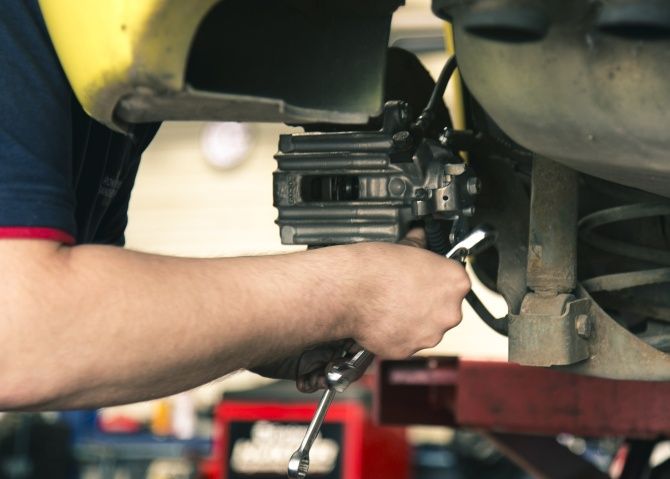 | « Back to article | Print this article |
There are 230 million vehicles on the road, and counting. Bulk of these are under seven years old and once they get older, the industry estimates the requirement for spare parts and aftersales service to shoot up sharply.

As cars become technologically more complex, the aftercare market, which has been the preserve of independent garages so far, has started to draw the attention of big players. The roadside mechanic wielding a wrench is slowly making way for original equipment manufacturers, who are sensing opportunity in organising the unorganised players for long-term growth and deeper engagement with customers.
Aftersales care is set to become a Rs 750-billion industry by 2020, from Rs 560 billion currently. There are 230 million vehicles on the road, and counting. Bulk of these are under seven years old and once they get older, the industry estimates the requirement for spare parts and aftersales service to shoot up sharply.
Is the aftermarket industry ready to handle complex repair jobs? In most cases, no, says G Srinivasa Raghavan, executive director, TVS Automobile Solutions, an aftermarket player that is part of the $7-billion TVS Group. Will it be ready in two years? "The answer is, yes," he says.
Driving the change is the narrowing price gap between the organised and the unorganised sector brought about by the Goods and Services Tax (GST). On many parts, like filters, the taxes have fallen to 18 per cent from around 30 per cent before GST.
Manav Kapur, executive director, Steelbird International, an auto-component manufacturer, says: "Pre-GST, the unorganised and counterfeit market was thriving because of high taxation. Nearly 32 per cent of the total cost of a product was going towards tax. Subsequently, it dropped to 18 per cent in most cases, which led to a price drop and a level-playing field."
At the same time, the Original Equipment Manufacturers (OEMs) are also increasingly realising the importance of aftermarket service in attenuating the effects on the cyclical nature of their core business, where sales zoom when the economy is doing well and slump in certain other seasons.
The automotive aftermarket refers to the secondary market of automotive industry which involves manufacturing, re-manufacturing, distribution, retailing and installation of all types of vehicle parts and accessories after the sale of automobiles by its original equipment manufacturer to consumers.
Balasubramanian Srinivasan, executive director (automotive & transportation practice), Frost & Sullivan, pegs the growth in aftersales market at around 10.4 per cent annually. This is only a tad slower than the 11 per cent growth in the first half of 2018 in new vehicle sales.
Currently, the OEMs have 40 per cent of the market, with independent players accounting for the rest. Of the 60 per cent, however, only 40 per cent is organised. After the warranty period, 70 per cent of passenger car owners walk out from the branded service centres and move to private garages. The share of the unorganised sector is even higher for trucks and two-wheelers.
TVS Automobile Solutions is trying to organise the aftersales market by bringing independent players under its brand. The initiative called TVS PartSmart is a multi-brand retail chain for commercial vehicles. It currently has around 200 franchisees nationwide. PartSmart addresses the concerns of working capital requirements, stock obsolescence, and timely payments by offering consignment stocks and stock take-back policy for its franchisees.
After the shake-out, Raghavan says, there will be three set of players who will dominate the space: independent aftermarket players like TVS; OEMs who would be selling their own brands; and private labels.
For OEMs, joining hands with independent players is crucial to extending their own reach. Typically, they have an authorised service centre every 100 km, whereas independent garages are available every three km. So, by engaging meaningfully with the secondary channel, they can quickly bolster their aftermarket service without putting in huge investments in setting up their own outlets.
Customers do see value in going to branded outlets. Ashok Leyland’s spare parts business is growing at over 30 per cent annually. After GST, customers have to pay 10 per cent more for original parts. For example, a generic clutch plate may cost 10 per cent less than a branded clutch plate, but it lasts half as long and the price differential is wiped out the moment the vehicle breaks down for unscheduled maintenance.
Counterfeit is a big concern for the industry, however. Around 30 per cent of the parts being sold in the unorganised space is currently fake. To counter this, companies are revamping their packaging with multiple security features which are intended to make it difficult to duplicate products.
Ashok Leyland’s mobile app called Service Mandi connects rated mechanics with customers seeking quality service through secondary channels. Ashok Leyland estimates about 70,000 commercial mechanics in India and it claims to be engaged with more than half of this fraternity.
Raghavan says online e-retailing too will boost sales of genuine parts by letting customers compare market prices and pick the most convenient aftersales service for them. Online auto aftermarket in India is expected to grow at a CAGR of 7 per cent to about $150 million by 2020, according to industry estimates.
Country’s largest carmaker Maruti Suzuki’s genuine parts sales are growing by 24 per cent annually. "Customers are thinking twice before going to unauthorised service centres," says a Hyundai spokesperson.
"We service over five million repair orders in a year, which translates to over 0.56 million vehicles per month," he adds. An added draw is the digital experience these workshops provide. "Workshop automation allows us to provide customers real time information about their cars and they seem to like that."